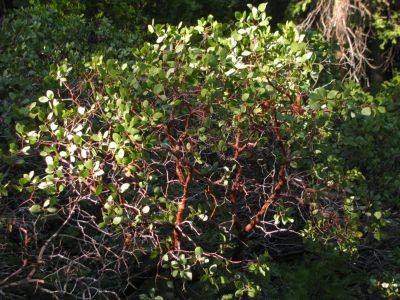What is Manzanita?
It’s important to learn about manzanita plants before growing them in your yard because they are native to a very specific region and require just the right conditions to thrive. In those areas, namely coastal and northern California, manzanita is prevalent. It is only hardy in USDA zones 8 through 10. It grows mostly in the dry foothills of the Sierra Nevada and Coast Range mountains. There are a few species of manzanita, but the one most often referred to and abundant in northern California is common manzanita. A large bush or small tree, the growth habit of the trunk and branches is twisting and unique. The bark is notable, shiny, and deep red making identifying the shrub easy. Manzanita flowers in the spring producing little cup shaped blooms that hang upside down. The leaves are shiny, bright green, and wedge shaped with a point at the end. Summer berries are white but turn red or brown as summer turns to fall.
Manzanita Care
If you have the right conditions for it growing a manzanita tree is easy. These small trees thrive in dry, warm climates in almost any type of soil and in areas of full sun to partial shade. They do best in a spot where their deep roots can access water. Adapted to an area with dry summers, manzanita trees actually do not tolerate summer watering. If growing a manzanita in your yard, avoid watering more than once per month during the summer season. To be sure it will get enough water through its roots, plant near a stream, pond, or an area that gets boggy. Once you have established your shrub in the right area and with the best conditions, you won’t have to do much to keep it happy.
